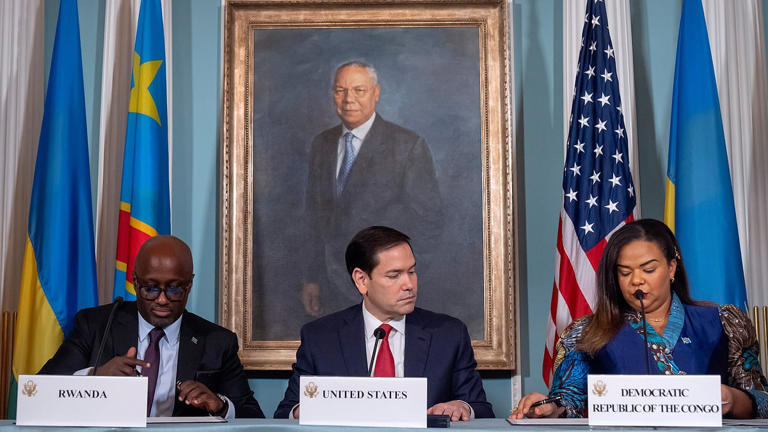Rwanda and DR Congo Sign Historic Peace Deal in US to End Rebel Conflict and Secure Mineral Cooperation
In a landmark move aimed at ending years of bloodshed and instability, Rwanda and the Democratic Republic of Congo (DRC) have signed a historic peace agreement in Washington, with both countries pledging to cease support for armed rebel groups. The deal comes after a devastating year of conflict, during which the M23 rebel group, widely believed to be backed by Rwanda, rapidly advanced across the mineral-rich eastern region of the DRC, capturing critical areas including the strategic city of Goma. The peace agreement, which has been in the works since before Donald Trump took office and was facilitated by Qatar, aims to bring an end to the violence that has claimed thousands of lives and displaced many more.
Speaking at the White House, former President Donald Trump welcomed the foreign ministers of both countries and described the day as a “wonderful” turning point for Central Africa. He claimed credit for the breakthrough, emphasizing the role of the United States in securing vital mineral rights from the Congo, a region rich in critical minerals like lithium and cobalt, which are essential for electric vehicles and advanced technologies. With China already a major player in the DRC’s mineral sector, the U.S. move is seen as a strategic effort to assert influence in the region.
While the deal does not directly address the territorial gains made by the M23, it calls for Rwanda to lift what it terms “defensive measures” and end any perceived support to the rebel group. Rwanda has consistently denied direct involvement with the M23 but has voiced strong opposition to the Democratic Forces for the Liberation of Rwanda (FDLR), a militia composed of Hutu extremists linked to the 1994 genocide. The peace agreement includes a commitment to the “neutralization” of the FDLR, a key demand from Rwanda, and Foreign Minister Olivier Nduhungirehe stressed that a verifiable end to all state support for the FDLR must be prioritized. He expressed cautious optimism but noted that past peace deals in the region had often failed due to poor implementation.
Congolese Foreign Minister Therese Kayikwamba Wagner emphasized the importance of state sovereignty and acknowledged the deep wounds caused by decades of conflict. She called the agreement a rare opportunity for real, on-the-ground change, though she admitted that healing will take time. The agreement also sets up a joint security coordination body to oversee the progress and calls for the creation of a regional economic integration framework within three months, signaling hopes for a broader transformation in the region’s political and economic landscape.
The international community reacted with a mix of praise and concern. United Nations Secretary-General Antonio Guterres hailed the deal as a “significant step towards de-escalation, peace, and stability” in the eastern DRC and the Great Lakes region. The chairman of the African Union Commission, Mahmoud Ali Youssouf, also commended the agreement, lauding it as a major milestone toward reconciliation. However, critics like Denis Mukwege, a Nobel Peace Prize-winning Congolese gynecologist and human rights advocate, voiced strong reservations. Mukwege warned that the deal might reward Rwanda and the U.S. for aggression and could legitimize the exploitation of Congo’s vast natural resources without holding perpetrators of violence accountable. His concerns were echoed by Physicians for Human Rights, which noted that the agreement lacks clear provisions for justice and accountability for widespread human rights abuses, particularly the use of sexual violence as a weapon of war.
Despite mixed reactions, the peace agreement between Rwanda and the DRC marks a potentially transformative moment for Central Africa. If implemented in good faith, it could pave the way for long-awaited peace and regional cooperation. However, the road ahead remains uncertain, and the success of this deal will depend heavily on sustained international pressure, transparency, and the commitment of all involved parties to prioritize justice, security, and the well-being of their citizens.
For video news, visit our YouTube channel THE OLIGO.

